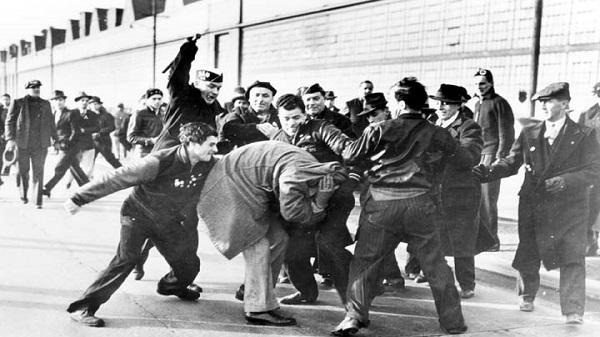Fascism is a highly nationalist and authoritarian government regime that had great relevance in Europe in the 20th century.
In Italy, the fascist regime was established after World War I under the command of Benito Mussolini, who ruled from 1922 to 1943. At the same time, fascist ideals were the basis for the rise of Nazism in Germany.
With ideas highly contrary to liberalism, Marxism and anarchism, fascism is classified as a far-right regime marked by a dictatorial and militarized government.
See the 8 main characteristics that define this type of government.
1. Values nationalism

Fascist regimes strongly value the feeling of nationalism. Thus, it is common for fascist governments to use, in an exacerbated way, nationalist propaganda through slogans, symbols, music and flags.
In the name of nationalism, fascist governments use all possible forms of manipulation of the population, whether through the media, religion or even violence. Furthermore, the fascist regimes established in Italy and Germany constantly sought to expand their territory.
2. Totalitarianism and Corporatism

Fascism establishes a totalitarian government that exercises absolute control over citizens' rights, whether in the political, cultural or economic context. Furthermore, the government encourages corporatism among all sectors of society with the aim of creating an “Organic State”.
The greatest example of fascist corporatism occurred in Italy during Mussolini's rule. At the time, unions of workers and employers were created for each profession. These unions were subject to the supervision of the National Fascist Party, which ensured that all classes, from all areas, were always in harmony with the government's ideals.
3. Emphasis on militarism

Fascism is a regime that believes in the use of force and violence to achieve your goals. For this reason, the government devotes disproportionate amounts of resources to financing arms and wars, even neglecting other areas such as health or education. In this type of government, soldiers and military are vaunted by the masses.
In fascist regimes, the police are highly militarized and have ample autonomy to deal with internal and domestic problems that normally do not require military participation.
4. Obsession with national security

Fascist regimes have a constant need to prepare the nation for armed conflict. With this objective, terror speeches are propagated to cause a feeling of insecurity and paranoia in the population, which seeks to unite to fight for the same cause. Thus, fascism uses fear as an instrument of motivation.
5. Contempt for human rights

In a highly militarized and constantly confrontational society, government ideals are constantly imposed violently, convincing citizens that human rights are not priority. Thus, in fascism there is no valorization of freedom, physical integrity, equality or even life.
In fascist regimes, the contempt for human rights is transmitted to the population, which becomes colluded with practices such as executions, torture, arbitrary arrests, etc.
6. Contempt for intellectuals and artists

Since fascist governments have the support of the population, those who do not fit the nation's ideals are openly harassed.
For this reason, intellectuals and artists with the ability to question the regime and influence the people to to do the same are persecuted, and any form of insurgency against the State is repulsed in a way violent.
7. Media control and censorship

In order to maintain the integrity of the system, fascist regimes tend to control the media. Sometimes control is exercised directly by the government, and sometimes the media is indirectly regulated. In any case, censorship of ideas contrary to the regime is common.
8. Uses religion as a form of manipulation

In both Germany and Italy, fascism, in the early years, disputed the devotion of the people with the church. However, the two governments decided to use religion to their advantage to keep the ideals of the population in line and gather more followers. In this way, fascists began to draw forced parallels between religious precepts and political ideologies to manipulate people.
In Italy, Mussolini, in addition to being an atheist, had planned to confiscate church property until he decided to incorporate religious rhetoric into his speeches.
See too:
- Nazism
- Fascism
- totalitarianism
- Anarchism
- Liberalism
- antifa
